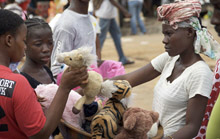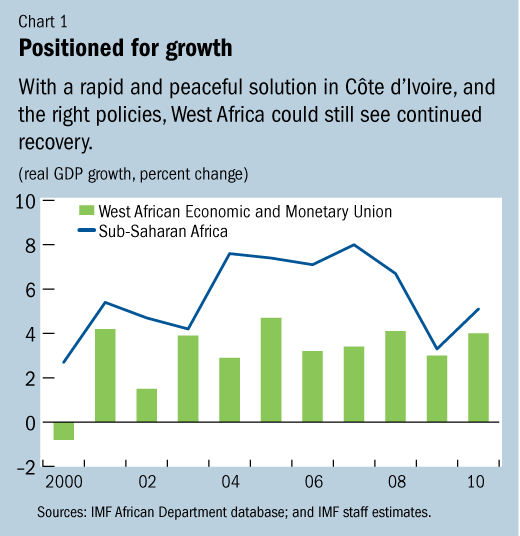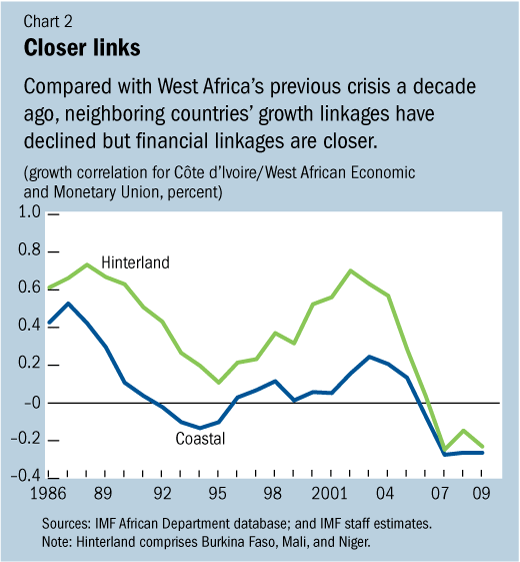
Typical street scene in Santa Ana, El Salvador. (Photo: iStock)
IMF Survey: West Africa's Recovery Threatened by Côte d'Ivoire Crisis
March 17, 2011
- Appropriate macroeconomic policies supported recovery in 2010
- Deeper structural reforms key to boosting growth
- Côte d'Ivoire crisis threat to economic growth, poverty reduction
West Africa’s ongoing economic recovery is being threatened by the prolonged political crisis in Côte d’Ivoire.

Market in Monrovia, Liberia: unresolved crisis in Côte d’Ivoire poses considerable risks through various transmission channels (photo: Newscom)
WEST AFRICA
The economic impact on the West African Economic and Monetary Union (WAEMU) and the broader region of last year’s disputed national elections in Côte d’Ivoire is still unfolding, but is becoming more severe as time goes on.
Economic growth in the WAEMU is estimated to have on average returned to levels reached before the 2007–08 global food and fuel price shocks and the global financial crisis. Growth has been supported by monetary and fiscal easing, good agricultural production, recovery in the region’s main trading partners, and a pickup in economic activity in Guinea-Bissau and Togo.
At the same time, average inflation remained low in all WAEMU countries, although it edged up in the second half of 2010. On average, annual consumer price inflation reached 1.4 percent, up from 0.4 percent in 2009. More recently, however, higher international oil and food prices have started to feed through to inflation, but, while rising, core inflation has remained subdued.
With a rapid and peaceful solution in Côte d’Ivoire and the right policies, the region could still experience a continuation of the recovery. Zone-wide economic activity was expected to edge up to close to 4½ percent in 2011 from 4.0 percent the previous year and 3 percent in 2009 (see Chart 1). But for this benign scenario to unfold, regional political stability is a necessary condition.

Risks to the outlook
The unresolved crisis in Côte d’Ivoire, which has intensified in recent weeks, poses considerable risks through various transmission channels, including through trade and transport links, remittances and migration, and financial sector linkages. Compared with the political crisis in Côte d’Ivoire a decade ago, neighboring countries have established alternate transport routes, and, combined with low intra-regional trade, the growth linkages have declined somewhat but financial linkages are now closer through the regional bond market (see Chart 2).

The closing of the offices of the Banque Centrale des Etats de l’Afrique de l’Ouest (BCEAO), the regional central bank, in Côte d’Ivoire in late January, as well as the closure of most banks since mid-February, has left the Ivoirien banking system in disarray. To reduce liquidity and solvency risks in the WAEMU banking sector, the BCEAO has since December 2010 rolled over maturing Ivoirien government paper, which is mostly held by WAEMU banks.
West African Economic and Monetary Union
Benin
Burkina Faso
Côte d'Ivoire
Guinea-Bissau
Mali
Niger
Senegal
Togo
Neighboring countries, Liberia in particular, are experiencing an influx of refugees that is putting pressure on scarce resources. Should the Ivoirien crisis persist, economic spillovers for the region will be significant, at a severe human and financial cost. A drop in economic output in Côte d’Ivoire, as was the case in 2000 and 2002, could push average regional growth below 3 percent, reducing per capita income and increasing poverty in Côte d’Ivoire and possibly the region.
In addition to the crisis in Côte d’Ivoire, a more sluggish global economy could also slow the West African recovery by dampening exports, remittances, and capital inflows. A persistent rise in international food and fuel prices poses inflationary risks, which need to be monitored.
Accelerating growth
In its annual regional consultation on common policies of the WAEMU, the IMF says it will be critical to accelerate recent reform progress and improve competitiveness.
In addition to political stability, key reforms needed to accelerate growth include
• Maintaining macroeconomic stability, supported by creating fiscal space for more priority spending through higher revenues and improvements in the quality of spending
• Deepening financial markets
• Strengthening coordination of domestic policies, including enhancing public financial management through timely implementation of relevant directives, and
• Pursuing faster broad-based structural reforms to improve the business climate, governance, and the energy sector.
Maintaining macroeconomic stability: Infrastructure needs are high and fiscal policy must maneuver accordingly. Over the medium term, fiscal policy must strike a delicate balance to overcome severe infrastructure deficiencies, while ensuring that the economy does not overheat and that public debt levels remain sustainable. The central bank should stand ready to tighten monetary policy, if rising food and fuel prices were to spill over into core inflation and inflation expectations. Laudable progress that has been achieved in implementing a new monetary policy framework needs to be supported by additional analytical underpinnings, and a clear and transparent communication strategy.
Deepening financial markets: Notwithstanding progress made to date, the pace of reform needs to be accelerated. The 2009 slowdown of economic activity has weakened the quality of assets held by banks. To strengthen supervision, there is need for more timely collection of financial soundness indicators and stepped-up financial stability analysis. The sector’s contribution to financing growth should be strengthened through further institutional reforms, including those that facilitate the use of collateral, information sharing, and maturity transformation.
Strengthening coordination of domestic policies: Progress in meeting convergence criteria for closer economic union has been uneven, and reforms to foster regional integration should be accelerated. Ongoing initiatives to clarify some definitions of convergence criteria and to improve the monitoring of domestic payment arrears are welcome. The ongoing evaluation of the Regional Economic Program 2006–10, which included a number of projects to foster regional integration, will provide a basis for its successor program. Regional projects should be based on sound economic profitability analyses.
Pursuing faster broad-based reforms: Fostering competitiveness is critical, in particular non-price competitiveness, including better infrastructure (for example, in electricity supply and roads), quality of institutions, and trade integration. The persistence of nontariff barriers, such as time-consuming border controls and frequent road blocks, hinder intraregional trade. With respect to countries outside the region, the past year’s weakness of the euro—to which the CFA franc is pegged—has helped to counteract some of the previous erosion of price competitiveness.


